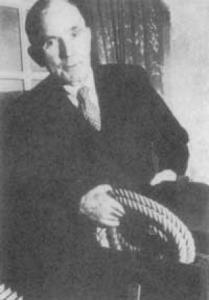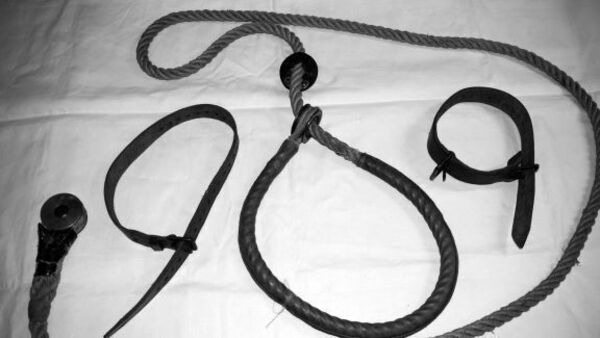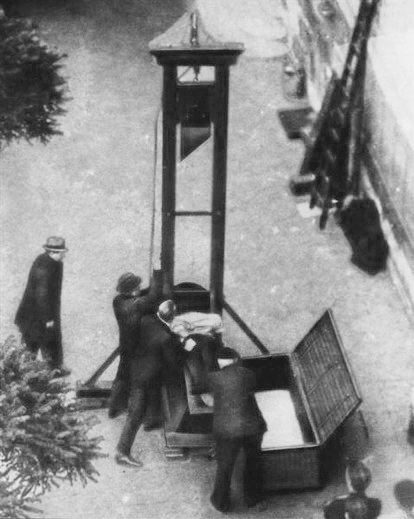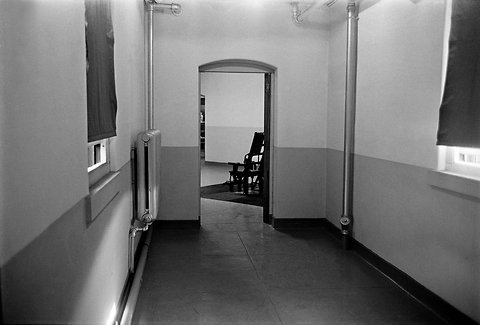Normally this time of year would be cause for celebration, a time of Christmas cheer and goodwill to all men. That wasn’t the case for Ethel Major who stood condemned for the murder of her husband Arthur. For her the previous couple of days had been spent sobbing and incoherent as she pondered her imminent date with the hangman.
Husband Arthur wasn’t, so it’s said, the most pleasant of men. A First World War veteran, truck-driver Arthur was also known to be a drinker and when he drank was particularly hard to live with. Some say his murder was the result of years of abuse and that Ethel killed him as a result.
Whatever her motive there can be almost no doubt that she took his life and at 9am on 19 December 1934 hangmen Thomas Pierrepoint would take hers. Nobody at Hull Prison knew, as the condemned cell’s lights burned brightly through the night, that it would be for the last time. Ethel would be only Hull’s tenth hanging of the 20th century and also its last. When the last prison officer to leave the cell switched off the lights they would never burn again.
It was far from the last time that Thomas Pierrepoint did his duty and it was only the beginning for his newly-appointed assistant (and nephew) Albert. Albert had only recently debuted on the scaffold, helping Tom hang Patrick McDermott in Dublin on 29 December 1932. Only his eighth ‘client,’ Ethel would also be his first time hanging a woman, a rare event even when Britain’s hangmen were at their busiest.
The ‘firm’ of ‘Uncle Tom and Our Albert’ would continue until Tom retired in 1946 and Albert would carry on the family profession until he resigned a decade later. Between them the pair would be involved in over 740 executions while Tom’s brother Henry (fired in 1910) had already added another 105. Woman or not Ethel was just another job, one of hundreds.
Ethel had married Arthur in 1918 after his return from the war and relations between them had deteriorated progressively. Ethel had had an illegitimate daughter, Auriel, before meeting him and kept it a secret, the child being raised by her parents and passed off as her younger sister. The morals of the time being what they were this wasn’t unusual and had been kept from Arthur. Arthur was furious when he finally found out and the couple lived virtually separate lives from then on.
Arthur’s difficult personality may have been the result of his wartime service during which he was severely wounded. It certainly wasn’t improved by his drinking which was regular and considerable. Ethel wasn’t popular either, being known locally as quarrelsome and cantankerous and generally disliked.
His mood darkened further when Ethel accused him of infidelity with a neighbour and produced alleged love letters that she had probably written herself. Arthur, enraged by the accusation, exploded when it emerged a letter had gone to the neighbour from a solicitor, supposedly at Arthur’s instruction, telling Rose Kettleborough to keep away from him.
It emerged that Ethel had told the lawyer Arthur wanted it done without his knowledge. Arthur’s retaliation consisted of publishing an open letter to the town’s shops and merchants declaring himself no longer responsible for her debts. In turn Ethel forged a letter to the local council, attempting to have Arthur’s name taken off their tenancy and the home be made exclusively hers. She also tried to lose him his job, telling his employers he was an habitual drunk-driver. Ethel seemingly developed quite a history of faking letters and documents when it suited her, something that did her no favours when she went on trial for murder.
By May 1934 the couple were in a state of open war. On 23 May Arthur sat down at work to eat his lunch. After only a bite or two he discarded his corned beef sandwiches complaining that they tasted bad and that his wife was trying to poison him. She certainly was, laced with strychnine the discarded sandwiches were pecked at by some birds. They died almost immediately.
Strychnine, a member of the bitter alkaloid family of poisons, is also one of the worst possible ways to die. Wracked with convulsions, uncontrollable muscle spasms, agonising pain and growing gradually more exhausted, its luckier victims die within hours. The unlucky ones suffer for days. eventually, after the poison has seized cotrol of the muscles and parts o the nervous system, they die from respiratory paralysis or sheer exhaustion. Once used for pest contril, it’s now considered so dangerous that possession is illegal in the Uk without a licence.
Arthur was already unwell by the end of the day. By the next day he was dead from what the doctor believed to be epilepsy. An easy mistake when you consider that an epileptic fit and strychnine poisoning can be very similar to look at. With unseemly and suspicious haste Ethel wanted Arthur’s funeral performed the next day, but was dissuaded. The authorities were already suspicious when the next day an anonymous letter directly accused Ethel of poisoning her husband:
“Sir, Have you ever heard of a wife poisoning her husband? Look further into the death (by heart failure) of Mr Major of Kirkby-on-Bain. Why did he complain of his food tasting nasty and throw it to a neighbour’s dog, which has since died? Ask the undertaker if he looked natural after death. Why did he stiffen so quickly? Why was he so jerky when dying? I myself have heard her threaten to poison him years ago. In the name of the law, I beg you to analyse the contents of his stomach.”
Singed ‘Fairplay’ the letter accused her not only of poisoning her husband, but of feeding some scraps to her neighbour’s dog. Ethel, despising both the dog and the neighbour, normally chased it away instead of offering it treats. Having eaten the scraps the dog also died almost immediately. With suspicion now too strong to ignore and the doctor having made a mistake, Ethel was about to make an even bigger one. A simple slip of the tongue would pave her path to the gallows.
Chief Inspector Young was suspicious from the start. His suspicions only hardened when Ethel, unprompted, denied preparing her husband’s food and made a point of mentioning her unusually-fervent dislike of corned beef. Still unprompted, she also told him she had no idea of how strychnine could have killed her husband.
Young, having made a point of not mentioning strychnine or corned beef, was sure he had a murderer standing right in front of him. He arrested her almost immediately. Her response to his remark about strychnine was simple:
“Oh, I’m sorry. I must have made a mistake.”
Indeed she had, a most disastrous one at that. The charge laid against her was one of wilful murder by poison. The penalty was death by hanging.
When Home Office expert Roche Lynch found strychnine in Arthur’s body it was obvious that he’d been deliberately poisoned. Both the dog and some discarded corned beef were also found to contain the poison. Ethel’s position only worsened when it emerged that she’d previously threatened his life and that she had access to the poison that killed him. Her father, a gamekeeper by profession, kept a variety of poisons in a locked wooden box to which he had the only key. The other key, he told police, had been lost years before. When that missing key was found in Ethel’s possession her fate was effectively sealed. That the key had been hers for so long suggested not a sudden decision to poison her husband, but a long-held intent to do so.
She would almost certainly be convicted and condemned, the death sentence being mandatory in 1934. But, even if convicted, would she hang?
Her guilt, clear though it already was, was left to the jury to decide. After a brief trial at Lincoln Assizes they took only an hour to do so, finding her guilty with a strong recommendation for mercy. As the jury foreman put it:
‘I also wish to express the jury’s wish that a strong recommendation for mercy should be given to the prisoner.’
After passing the death sentence on a sobbing Ethel the trial judge also strongly recommended mercy to Home Secretary Sir John Gilmour. A large petition was circulated and the Lord Mayor personally asked the King to intervene. Unlike the jury, the Lord Mayor and the people in the local area, the judge probably knew full well it would make no difference whatsoever. Normally the judge’s recommendation could have made a difference, especially with a female appellant, but for an unwritten law in the corridors of power;
The Home Office never reprieved poisoners, male or female.
The only exceptions to that grim tradition were pregnant women who by law couldn’t be hanged. Poisoners were regarded by officialdom as a particularly cold-blooded, treacherous and remorseless breed of murderer that society was invariably better off without. The public remained unaware that clemency often depended far more on a judge’s recommendation than the jury’s. Most were unaware that petitions, marches, placard-waving and crowds gathering outside prisons had no effect, either. Nor, most of all, were the public told that poisoners would almost certainly hang regardless of the circumstances.
From the moment the jury rendered their verdict Ethel Major was effectively dead.
The usual form letters went to Tom and Albert Pierrepoint offering them another morning’s work. Arriving at Hull Prison the day before, the newly-qualified Albert had asked his uncle if there was any difference between hanging men and women. Tom quickly reassured him;
‘I shall be very surprised if Mrs Major isn’t calmer than any man you’ve seen so far.’
She had in fact spent the preceding days in a state of emotional and nervous collapse. Finally realising that mercy wasn’t going to be shown she had little to do but watch the clock until the strain had become too much. By the time the Pierrepoints came for her she was beyond either consolation or even resistance, being half-carried the few steps between the condemned cell and the noose itself. Preserving his belief that women were far less likely to cause a problem, Tom only strapped her arms fairly loosely behind her back. Seconds later Ethel was gone, she probably didn’t even know she’d died.
Many years and hundreds of hangings later (including those of numerous women) Albert upheld his uncle’s belief based on his own experience. Women, he later remarked, were far less likely to be troublesome on their way to the gallows. The bravest person he ever hanged, he said, was Ruth Ellis in 1955. The last woman to hang in Britain and third-to-last for Pierrepoint before his resignation, he described her thus:
‘I have seen some brave men die, but nobody braver than her.’





Leave a Reply